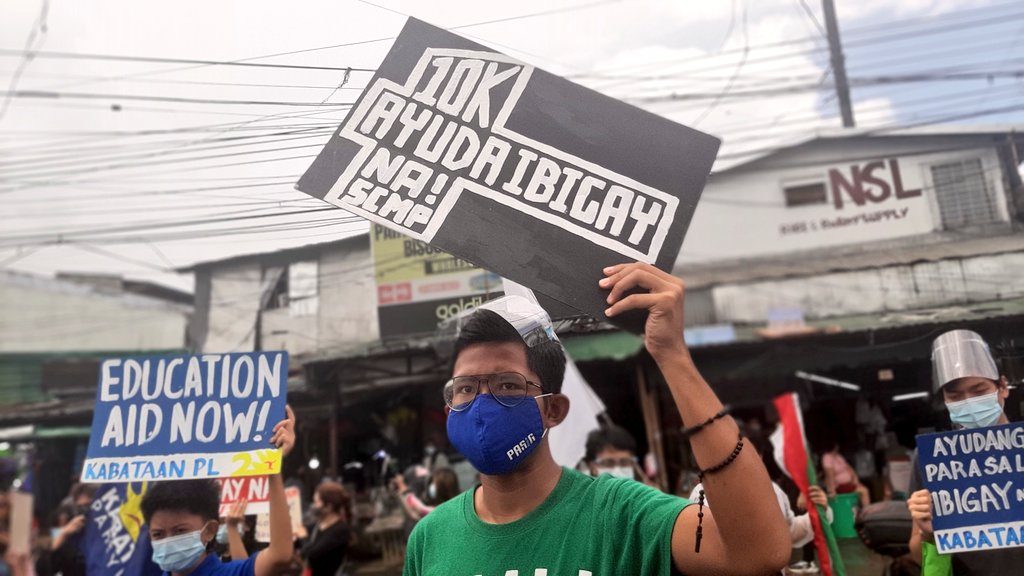SUMMARY
This is AI generated summarization, which may have errors. For context, always refer to the full article.

Before the enhanced community quarantine (ECQ) takes effect in Metro Manila on Friday, August 6, protesters urged the government to provide financial aid to Filipino families during the 2-week lockdown.
Some progressive groups, including the College Editors Guild of the Philippines (CEGP), Bahaghari, Student Christian Movement of the Philippines (SCMP), Kabataan Partylist, and KMU amplified these calls in a mobilization on Thursday, August 5, along the Commonwealth Avenue in Quezon City.
“Ngayon kailangan ng mamamayan ang tulong, habang kinakalampag natin ang gobyerno para sa ayudang sapat, magtutulungan pa rin tayo sa abot ng makakaya,” Kilusang Mayo Uno (KMU) secretary Jerome Adonis said.
(Now that the people need help, while we call on the government for enough financial aid, let’s continue to help each other to the best that we can.)
Presidential spokesperson Harry Roque said on Monday, August 2, that low-income individuals will receive a cash aid of P1,000 per person or a maximum of P4,000 for each family in Metro Manila during the ECQ. This is less than the amounts groups have been advocating for.
Groups like CEGP and SCMP call for a P10,000 cash aid per family, while KMU is asking for a P5,000 financial assistance for those affected by the lockdown, including drivers, vendors, and other workers.

Back in April, economists warned that the lack of cash assistance during the ECQ could defeat the purpose of a hard lockdown, since poor families have to go out to look for work.
Meanwhile, other organizations decried on social media the government’s pandemic response ahead of the ECQ, citing the lack of mass testing and vaccines in the country.
“Upang mapuksa ang COVID-19 virus at makabalik sa trabaho at kabuhayan ang mga Pilipino, kailangang tugunan ng rehimen ang pandemya ng makamasa at nakabase sa siyensiya na solusyon,” Anakbayan said in a post.
(To defeat the COVID-19 virus and for Filipinos to get back to work, the administration must address the pandemic through pro-people and scientific solutions.)
Around 21,210,129 vaccine doses have been administered in the country as of Sunday, August 1. However, only 8.5% of the Philippine population or 9,369,625 people have been fully vaccinated.
To guard against the Delta variant, the Department of Health allowed local governments in the National Capital Region on Monday to vaccinate anyone who was willing to get the COVID-19 jab, whether or not they were included in priority groups.
Metro Manila will be on lockdown from August 6 to 20 to avoid a surge in COVID-19 cases due to the Delta variant. During the ECQ, only essential establishments such as hospitals, groceries, courier and delivery services, certain manufacturing firms, and business process outsourcing will be fully operational. —Rappler.com
Patricia Kahanap is a Rappler intern and a fourth-year journalism student from the University of Santo Tomas.
Add a comment
How does this make you feel?
There are no comments yet. Add your comment to start the conversation.